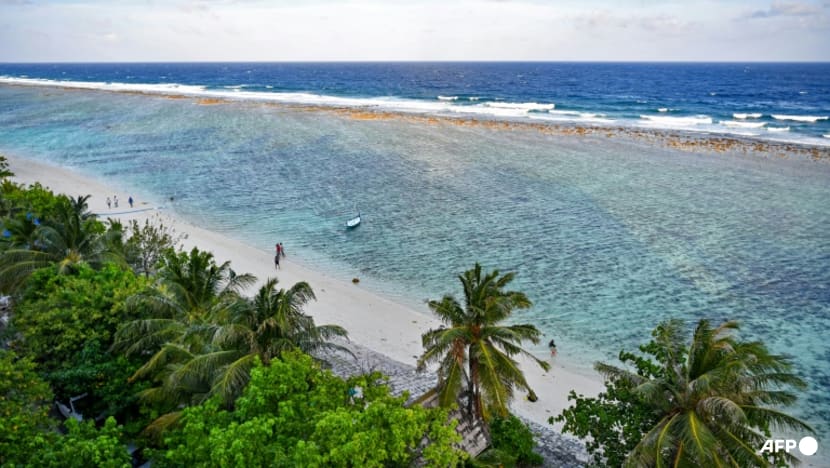Smaller fish, bleached corals: Maldives hit by several threats from climate change
CNA visited the popular tourist destination to find out how it has been affected by climate change and human activities, like plastic pollution.


This audio is generated by an AI tool.
MALDIVES: A decade ago, Maldivian fishermen like Ahmad Ashfam did not have to venture far to secure a bountiful catch.
But with surface temperatures of the Indian Ocean rising at an alarming rate, the quality and quantity of their hauls have declined. They must also battle more erratic and extreme weather conditions.
“We don't see that (many fish) and also we see a change in the size of the fishes. That is definitely something which we notice due to climate change,” Mr Ashfam told CNA.
While the 41-year-old relies on the ocean’s bounty to support his family, his daily excursions have grown increasingly challenging over the years.
Fishing is the second-largest industry in the Maldives, a tiny island nation famed for its pristine beaches and crystal-clear blue waters.
CNA looked at how the haven of beauty and tranquility is now battling several issues such as climate change, rapid coastal development and plastic pollution.
TRAINING FOR FISHERMEN
Over the past 50 years, sea surface temperatures in the Indian Ocean have risen 50 per cent faster than the global average due to climate change. This disrupts the natural migration patterns of fish, pushing them into cooler and deeper waters.
Fishermen have also been forced to battle more unpredictable weather patterns while out on their boats.
“Now the fishermen spend a lot of time out at sea. They spend about a week minimum out at sea,” said Maldives Fishermen’s Association secretary-general Abdulla Shakir Mohamed.
“So, if the sea is rough, if the weather is bad, then that will definitely (pose) problems (for) them returning back to the base or to their home island.”
The association engages with thousands of fishermen, and equips them with essential skills to navigate these challenges.
Mr Abdulla said these skills include how to collect and analyse data, as well as how to identify different types of clouds and changes in weather patterns.
The training provided focused on how weather conditions change and how this affects smaller island communities, he added.
In the face of climate change, fishermen have learned to embrace sustainable fishing practices, while relying on technology to chart a new course forward. But every day at sea remains a gamble for these guardians of the sea.
“In the olden days, like maybe 10 years ago, during the season changes, everybody would go out to the reef edges where they (could get a) good number of fishes,” Mr Ashfam lamented.
“Now, it’s been affected.”
CORAL BLEACHING TAKES ROOT
Rapidly warming sea surface temperatures have also threatened the country’s coral reefs, which serve as an underwater fortress for marine life and are often hailed as the rainforests of the sea.
Maldives has one of the most extensive coral reef ecosystems in the world. Coral reefs can protect coastlines from storm surges and erosion.
They also play a key role in Maldives’ economy by supporting its main industries of fishery and tourism.
Other human activities, including dredging and development, have affected coral reefs as well.
Scientists and locals are working together to find ways to protect and restore the reefs, which are already showing signs of bleaching this year despite the country not being in its hottest period.
“If it continues for a long time, then lots of corals are going to die this summer,” said marine biologist Emma Keen from Le Meridien Maldives Resort and Spa.
Bleaching is triggered by water temperature anomalies that cause corals to expel the colourful algae living in their tissues, turning them a ghostly white. Without the algae's help in delivering nutrients to the coral, the corals cannot survive.
Scientists like Ms Keen collect bits of coral that break off from the reef. These bits are then attached to a frame, allowing them to regenerate and continue growing instead of dying.
“We put the frames in places where there may not be coral already, so that they can start to grow a reef there and help the coral reef to stay healthy in this area,” Ms Keen added.
EFFORTS UNDERWAY TO TACKLE PLASTIC WASTE
Meanwhile, another environmental issue has plagued the Maldives islands – plastic pollution.
While the problem is at risk of worsening as its population grows, efforts are underway to engage local communities in reducing the issue. It has also banned single-use plastics and improved waste management facilities.
The country’s plastic footprint is currently about 12 per cent of its total waste, or more than 43,000 tonnes of plastic a year.
This comes from its citizens and tourists who flock there seeking an escape. The capital Male is one of the most densely populated cities in the world, housing about 200,000 people on 8.3sqm of land.
Dr Edward Addai, UNICEF representative to the Maldives, said the issue stems from urbanisation.
“The country is trying to do well with single-use plastics but it's engulfed with environmental issues, sanitation issues,” he added.
“Along the beaches, you see plastic used, plastics all over the place. It’s a major, major challenge.”
Related:
Non-governmental organisations such as Parley for the Oceans, which focuses on protection of the oceans, are stepping up to do their part.
Parley has tapped its extensive network across the Maldives islands to get local councils, resorts and fishermen to help collect plastic waste from both land and sea. The waste is then ferried to Male with the help of boat operators, and sent to a centre for processing.
Plastic bottles are compacted into blocks, reducing the volume of waste and making transport easier. These blocks will then be shipped to recycling facilities in Germany and Taiwan where they will be given a new lease of life.
Parley is also looking to raise more awareness about different types of plastic waste and the threats they pose to the ocean.
Its executive director Shaahina Ali said the group wants to engage the civil society to be a part of its collaboration network.
“They can actually lead their island community to become champions in an interception, avoiding plastics and bad materials and redesigning their community,” she added.

















